

Composer Nico Muhly’s treatment of the 1961 Winston Graham novel Marnie, which debuted in North America last night, chronicles a disturbed woman prone—for reasons having something to do with repressed trauma and a hypersexual mom in a wheelchair—to robbing offices and trading identities.
It’s an opera that asks its audience to set aside latter-day discomfort and do its best to stomach a dated story that Alfred Hitchcock already told, and told better, in 1964—even if this retelling features some extraordinarily modern musical idioms.
In a word, kind of a tradeoff. Act two is better than act one.
When it premiered nearly a year ago at the English National Opera, critics were far from blown away by the opus, but almost unanimously entranced by Michael Mayer’s production, particularly its midcentury appearance: the chic projection sets by Julian Crouch and 59 Productions; Arianne Phillips’ vibrant and modish costumes washing the stage in Technicolor.
Mayer brings these same high-fashion sensibilities to the Met, the company that had originally commissioned the work after mounting Muhly’s muddled Two Boys in 2013. The results, however, while certainly expensive-looking, do little to improve on what was basically a foolish libretto to begin with.
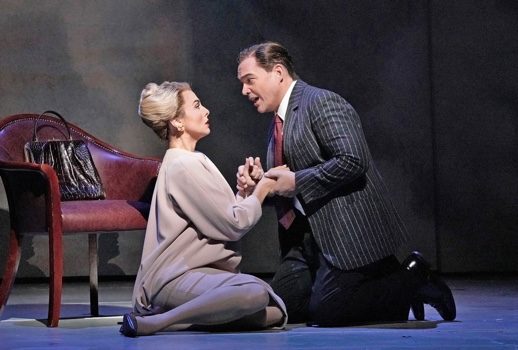
One wishes the music did more to elevate the psychobabble. Muhly’s pointillist score, apparently arranged to pair instruments and motifs with characters and motivations, is a tuneless bog of hooting flutes, oboes, and percussive celestas (how on earth does one “bang” on a celesta? Nico Muhly has answers!), the vocal line mostly ungenerous and disinclined to resolve.
This is all a shame, as the Met has lined the show with such an able conductor and cast. Making the most of his Met debut, conductor Robert Spano introduces us to dynamic countertenor Iestyn Davies as the lecherous Terry Rutland and rugged baritone Christopher Maltman as his rapey brother Mark (both parts completely wooden as written); the Mr. Strutt of tenor Anthony Dean Griffey; legendary mezzo-soprano Denyce Graves as Marnie’s cruel and disabled mother. Jane Bunnell, handed one of the opera’s dramatic climaxes, wails through a concluding revelation scene that could well have been devastating, but wasn’t.
As the enigmatic Marnie, cheekbone-endowed mezzo Isabel Leonard looked awesome onstage, stalking around in her platinum French twist and rainbow palette of pea coats (even a bright canary yellow one, cute but odd for committing a robbery), and gracefully commanded the scenery without overwhelming it.
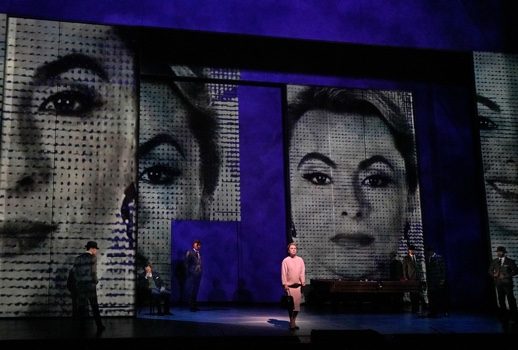
Though rarely alone in the world and often accompanied, Marnie, we learn, is ultimately a solo creature, one who transgresses in secret and who appears different to each of her beholders. Hitchcock, a connoisseur of surface identities, knew this part well.
But for an opera that takes such pains to spotlight the superficial, solitary, and protean nature of persona—a gambit hardly alien to feminist thought—I must say I still found much of the work just pretty fucking sexist, a stock romanticizing of the elusive femme fatale who just needs a man to show her what true self-understanding can look like.
Opera can be so much more than this. When Tippi Hedren, Hollywood’s original Marnie, took the stage during curtain calls last night, it was hard not to notice how much more petite she was than I’d imagined, having only ever encountered her onscreen.
Like cinema, the theater certainly maximizes, blows people up. But theater also reduces, making actors accessible through flesh-and-blood proximity.
This is what I want from my modern operatic heroines: not tortured Sixties archetypes who must find themselves through marriage or on the analyst’s couch, but fully-formed women who don’t need to disguise themselves in the first place.
Photos: Ken Howard / Met Opera














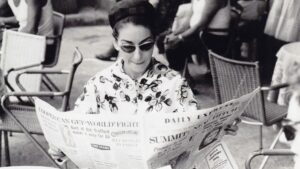
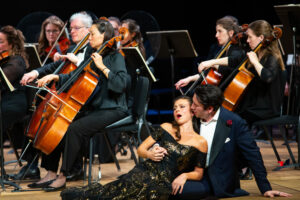

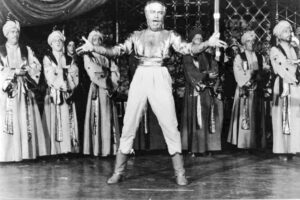
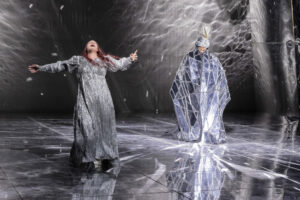








Comments